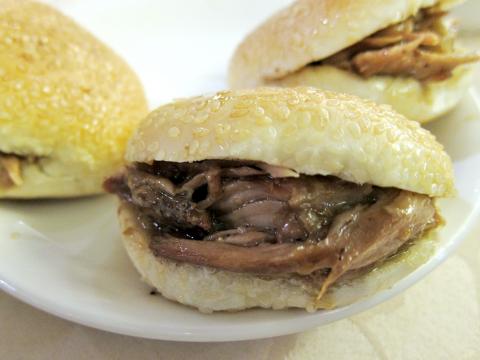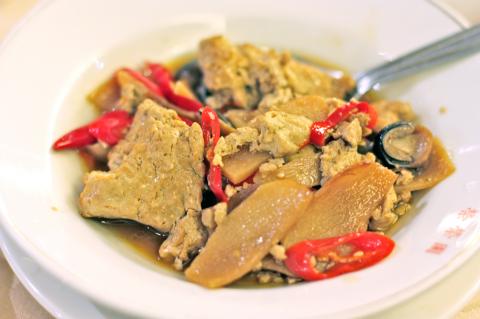Located near the intersection of Xinyi Road (信義路) and Fuxing South Road (復興南路), Rong Rong Yuan (浙寧榮榮園) is one of Taipei’s most popular Zhejiang cuisine restaurants.
Rong Rong Yuan’s signature dish is braised spare ribs (烤排骨, NT$400), which is wrapped in tin foil and slow-cooked. The process ensures that the meat is succulent and so tender that it slips off the bone. Make sure to order plenty of guangbing (光餅) to stuff the pork into. The savory, flaky buns are covered with crunchy sesame seeds and soak up the rich, smoky-tasting gravy.
Ningbo cuisine’s emphasis on fresh seafood is reflected by Rong Rong Yuan’s expansive menu, which features an aquarium of creatures including crabs, scallops, eel, fish, and 15 shrimp dishes. Overwhelmed by the selection, I asked a waitress for a recommendation. She suggested tilefish (馬頭魚, or “horse-head fish” in Mandarin) with stir-fried tofu, which was not on the menu (price varies by season and weight). Like the braised spare ribs, the fish had a mellow and sweet flavor, but the dish was enhanced with a mound of chopped scallion and cloves of garlic that had been cooked until buttery in texture. The slices of tofu were firm but silky and worked very well with the delicate taste of the fish.

Photo: Catherine Shu, Taipei Times
Our waitress also suggested the sauteed pea shoots and bamboo (清炒豆苗冬筍, NT$268) and stinky tofu (臭豆腐, NT$120). Rong Rong Yuan’s version of the odorous classic is fermented using a special technique for extra pungency and served with plenty of diced chili peppers. The vegetables were light, but surprisingly delicious for such a basic dish. The pea shoots were a good palate cleanser after our flavorful entrees.
Our complimentary dessert consisted of fried yuanxiao, or balls made of glutinous rice flour and stuffed with sweet black sesame paste, deep-fried and then coated with a light sprinkling of peanut powder.

Photo: Catherine Shu, Taipei Times

Taiwan has next to no political engagement in Myanmar, either with the ruling military junta nor the dozens of armed groups who’ve in the last five years taken over around two-thirds of the nation’s territory in a sprawling, patchwork civil war. But early last month, the leader of one relatively minor Burmese revolutionary faction, General Nerdah Bomya, who is also an alleged war criminal, made a low key visit to Taipei, where he met with a member of President William Lai’s (賴清德) staff, a retired Taiwanese military official and several academics. “I feel like Taiwan is a good example of

March 2 to March 8 Gunfire rang out along the shore of the frontline island of Lieyu (烈嶼) on a foggy afternoon on March 7, 1987. By the time it was over, about 20 unarmed Vietnamese refugees — men, women, elderly and children — were dead. They were hastily buried, followed by decades of silence. Months later, opposition politicians and journalists tried to uncover what had happened, but conflicting accounts only deepened the confusion. One version suggested that government troops had mistakenly killed their own operatives attempting to return home from Vietnam. The military maintained that the

Before the last section of the round-the-island railway was electrified, one old blue train still chugged back and forth between Pingtung County’s Fangliao (枋寮) and Taitung (台東) stations once a day. It was so slow, was so hot (it had no air conditioning) and covered such a short distance, that the low fare still failed to attract many riders. This relic of the past was finally retired when the South Link Line was fully electrified on Dec. 23, 2020. A wave of nostalgia surrounded the termination of the Ordinary Train service, as these train carriages had been in use for decades

Lori Sepich smoked for years and sometimes skipped taking her blood pressure medicine. But she never thought she’d have a heart attack. The possibility “just wasn’t registering with me,” said the 64-year-old from Memphis, Tennessee, who suffered two of them 13 years apart. She’s far from alone. More than 60 million women in the US live with cardiovascular disease, which includes heart disease as well as stroke, heart failure and atrial fibrillation. And despite the myth that heart attacks mostly strike men, women are vulnerable too. Overall in the US, 1 in 5 women dies of cardiovascular disease each year, 37,000 of them